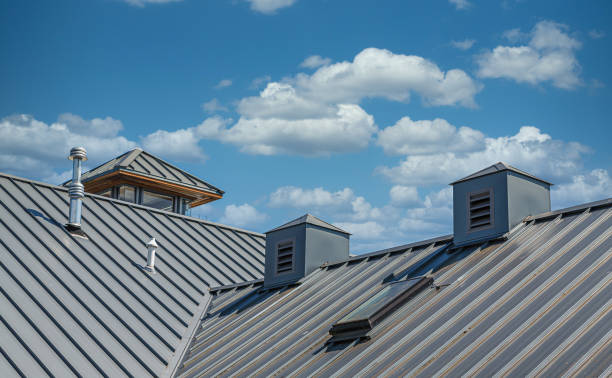Because of its remarkable strength and longevity, metal roofing has become a popular option for commercial building roofing. In contrast to conventional roofing materials such as wood shakes or asphalt shingles, metal roofing provides owners of commercial properties with a number of advantages that go well beyond looks. We will examine the robustness and longevity of Metal roofing for commercial buildings in this extensive guide, emphasizing why it has emerged as a popular option.
The Strength of Metal Roofing
Metal roofing is renowned for its impressive strength, which is a crucial factor for commercial buildings. The strength of metal roofing is derived from several key attributes:
1. Exceptional Weight-Bearing Capacity
Commercial buildings often have flat or low-slope roofs that require rooftop equipment like HVAC units, exhaust fans, and solar panels. Metal roofing’s robust structure can bear the weight of these installations without the need for extensive reinforcement, making it a practical choice for commercial applications.
2. Resistance to Impact
Because of their extreme resilience, metal roofing materials can endure hail, falling debris, and even severe weather. This impact resistance reduces the possibility of damage and expensive repairs for owners of commercial property.
3. Structural Integrity
Metal roofing is designed to maintain its structural integrity even under heavy loads like accumulated snow or standing water. It remains stable and secure, ensuring that the roof can handle the demands of various weather events and prevent structural damage.
4. Fire Resistance
Commercial buildings must adhere to strict safety regulations, and fire resistance is a top priority. Metal roofing materials are inherently fire-resistant and often have Class A fire ratings. This property provides peace of mind to commercial property owners, as it reduces the risk of fire-related damage.
5. Wind Resistance
Because metal roofing is so strong against wind, it’s crucial for commercial buildings located in hurricane- and severe storm-prone locations.
6. Low Maintenance Requirements
The strength of metal roofing extends to its low maintenance requirements. Commercial property owners can enjoy a durable roofing solution that doesn’t demand regular upkeep, saving time and resources over the long term.
The Durability of Metal Roofing
One of the main qualities of metal roofing that makes it so good for commercial buildings is its durability. Commercial real estate is frequently an investment that must be protected over time, which is why a sturdy roofing system is crucial. Several important elements contribute to the longevity of metal roofing:
1. Longevit
The extraordinary endurance of metal roofing is one of its most alluring features. With the right care, metal roofs can outlast typical roofing materials, which may need to be replaced every 20 to 30 years, for up to 50 years.
2. Corrosion Resistance
The materials used for metal roofing are intended to withstand rust and corrosion. This is especially crucial for business buildings located in industrial or coastal regions where exposure to saltwater and corrosive substances is frequent.
3. Resistance to Environmental Stressors
Extreme temperatures, UV exposure, and significant rainfall are just a few of the environmental stresses that metal roofing is designed to handle. When exposed to sunshine, it does not deteriorate, fracture, or lose its color, guaranteeing a durable and appealing appearance.
4. Resistance to Water and Moisture
Metal roofing offers excellent protection against water and moisture infiltration. Proper installation and sealing of seams and fasteners prevent leaks and water damage, ensuring the building’s interior remains dry and damage-free.
5. Low Material Deterioration
Over time, some roofing materials can deteriorate, leading to costly repairs or replacements. Metal roofing experiences minimal material deterioration. It remains stable and retains its strength and integrity, even in harsh weather conditions.
6. Energy Efficienc
Commercial buildings might use less energy when they have energy-efficient metal roofs. A large amount of the sun’s heat can be reflected using cool roofing solutions, including reflective metal roofing, which lowers cooling costs and lessens material deterioration.
7. Adaptability
Metal roofing is incredibly adaptable and may fit a variety of roof configurations, such as sloping, low-slope, and flat roofs. Because of its versatility, it can be used with a variety of commercial building types and designs.
8. Environmental Sustainabilit
Durability is closely linked to environmental sustainability. Metal roofing’s extended lifespan reduces the need for premature disposal and replacement, minimizing waste and contributing to eco-friendly building practices. Many metal roofing materials are also recyclable.
Installation Tips for Metal Roofing on Commercial Buildings
To maximize the strength and durability of metal roofing on commercial buildings, it’s essential to follow proper installation guidelines:
1. Choose the Right Material
Choose the right kind of metal roofing material for your business structure. Copper, zinc, aluminum, and steel are among the options. Select the material that best fits your demands and budget, as each has distinct qualities and prices.
2. Ensure Proper Substrate and Decking
Proper substrate and decking are essential for a successful Metal roofing installation. Ensure that the roof deck is clean, free from debris, and has adequate insulation to minimize heat transfer and prevent condensation.
3. Quality Underlayment
Install a high-quality underlayment beneath the metal roofing material. The underlayment acts as an additional barrier against moisture and provides extra protection in case of water infiltration.
4. Seal Seams and Fasteners
Seam and fastener sealing is crucial to preventing water intrusion. Ensure that seams are properly sealed and that fasteners are appropriately placed and sealed to maintain the roof’s watertight integrity.
5. Flashings and Edge Detailing
Properly install flashings around roof penetrations and edge detailing to create a secure barrier against wind, rain, and other environmental elements. Flashings must be well-sealed and securely attached to the metal roofing material.
6. Regular Inspections and Maintenance
Even with its durability, regular inspections and maintenance are essential for preserving the strength and longevity of a metal roof. Inspect for damage, punctures, or wear, and address any necessary repairs promptly to prevent leaks and maintain the roof’s integrity.
7. Professional Installation
Installing metal roofing on commercial buildings is a difficult undertaking that requires both knowledge and skill. To guarantee that the installation is done correctly and complies with local building requirements, it is important to work with a licensed roofing contractor who specializes in metal roofing.
8. Manufacturer Warranties
Check the manufacturer’s warranty for the metal roofing material you choose. The terms and conditions of warranties can differ among items. To keep your guarantee covered, make sure the installation is done according to the manufacturer’s instructions.
Conclusion
Metal roofing is a great option for commercial buildings because of its extraordinary strength and longevity. Many owners of commercial properties choose it as their roofing solution because of its resilience to environmental stresses, long-term protection, and low long-term cost. Metal roofing guarantees a long-lasting, dependable, and aesthetically pleasing roofing system when built and maintained correctly.



